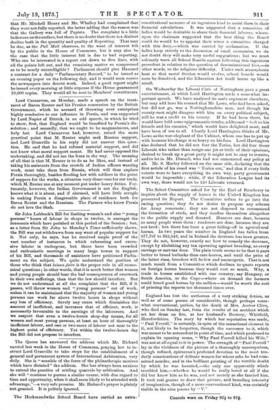Sir John Lubbock's Bill for limiting women's and also "young
persons" hours of labour in shops to twelve, is amongst the innocents which have perished at this period of the Session ; but, as a letter from Sir John to Monday's Times sufficiently shows, -the Bill was not withdrawn from any want of popular support for it. Not only, he says, has he received ample proof of the vast number of instances in which exhausting and exces- sive labour in undergone, but there have been crowded and enthusiastic meetings in many large towns in support -of his Bill, and thousands of assistants have petitioned Parlia- ment on the subject. We quite understand the position of -those who think that laissez-faire is the proper rule in all econo- mical questions ; in other words, that it is much better that women and young people should bear the bad consequences of overwork in their own sufferings, than that the law should interfere. But we do not understand at all the complaint that the Bill, if it passes, will throw women and "young persons" out of work, unless it can be maintained that the majority of women and young persons can work far above twelve hours in shops without any loss of efficiency. Surely any cause which diminishes the amount of inefficient, and increases that of efficient, work, is necessarily favourable to the earnings of the labourers. And we suspect that even a twelve-hours shop-day means, for all women and most young persons, at least an hour of thoroughly inefficient labour, and one or two more of labour not near to the highest point of efficiency. Yet within the twelve-hours day the Bill did not propose to interfere.


































 Previous page
Previous page